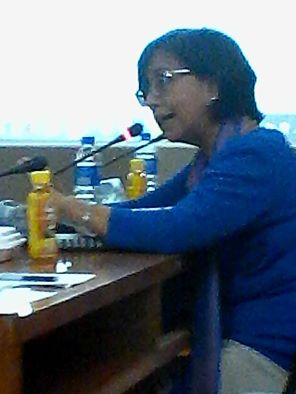by Maria Eleanor E. Valeros, #CebuBloggingCommunity
CEBU CITY, PHILIPPINES (May 28, 2015) — Peace process chief negotiator Miriam Coronel-Ferrer reiterates today here at the AFP Central Command in Lahug that the creation of the Bangsamoro Basic Law has no legal impediments.
Why is the Bangsamoro constitutional? Ferrer, through a presentation, pointed out that the creation of the Bangsamoro is provided for in the Philippine Constitution. She cited Article 10, Section 15 of the 1987 Philippine Constitution stating that “there shall be created autonomous regions in Muslim Mindanao and in the Cordilleras consisting of provinces, cities, municipalities, and geographical areas sharing common and distinctive historical and cultural heritage, economic and social structures, and other relevant characteristics within the framework of this Constitution and the national sovereignty as well as territorial integrity of the Republic of the Philippines.”
The creation of the Bangsamoro will follow a legislative process with the enactment of an organic act and its ratification in the core territory, this was the second point.
The third reason why Bangsamoro does not leap beyond legal parameters is that it follows the Constitution’s provision on legislative powers of an autonomous region while upholding national sovereignty of the Philippines.
“There is no substate. In fact, mahirap i-define kung ano talaga ang substate,” Ferrer stressed. “What Bangsamoro is is similar to the creation of ARMM only that we are granting to Moros their right to self-determination but still they are under one Philippines.
“Hindi naman buong Mindanao ‘to. The framework is actually for Central Mindanao. We recognize also the division among Moro groups, and that it takes two provinces to form an autonomous region. The salient points of the draft provide for a Bangsamoro government that is parliamentary and democratic. It will never be a separate state. It will remain under Philippine sovereignty.”
She cited Article 10 of Section 20 of the 1987 Constitution that “within its territorial jurisdiction and subject to provisions of this Constitution and national laws, the organic act of autonomous region shall provide for the legislative powers over: administrative organization; creation of sources of revenues; ancestral domain and natural resources; personal, family, and property relations; regional urban and rural planning development; economic, social, and tourism development; educational policies; preservation and development of the cultural heritage; and such other matters as may be authorizd by law for the promotion of the general welfare of the people of the region.”
Further, a ministerial form of government in the Bangsamoro is allowed under the Philippine Constitution. Based on Art. 10 of Sec. 15 “the organic act shall define the basic structure of government for the region consisting of executive department and legislative assembly, both of which shall be elective and representative of the constituent political units.”
“The Bangsamoro is a secular government, not an Islamic state,” Ferrer added. “We should give peace a chance. We should allow Bangsamoro to demonstrate its sincerity, more than a process of decommissioning of arms; allow them to prove they have respect for the basic rights of all.”###

